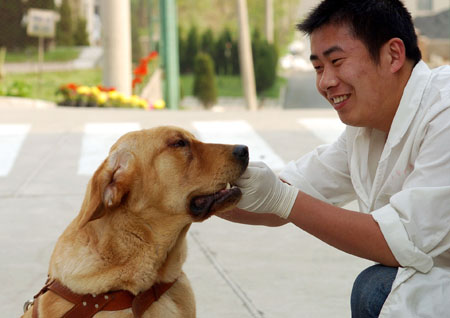DALIAN: "Stop. Sit. Go!" You Liang, 33, instructs "Stone," a Labrador
Retriever, at a simulated crossing in Dalian.
|

A trainer with
a seeing-eye dog training center in Dalian Medical School plays with a dog
named "QQ" May 17, 2006. Six seeing-eye dogs are to become the
first batch of graduates from the center next month, and will be put up
for adoption. People with impaired eyesight can fill out an application
and wait for approval from the China Disabled Persons' Federation.
[Xinhua]
|
You and Stone are taking training courses at the China Guide Dog Training
Centre, established late last month, in this city in Northeast China's Liaoning
Province. The centre is the first of its kind in the country.
Six adult dogs are currently undergoing training courses, including Stone. In
the near future, Stone will become the guide dog for You, a singer for the
Dalian Disabled Art Troupe, who is blind.
You is able to live and do housework by herself, but she needs help whenever
she goes out.
"I hope the guide dog will help me a lot and relieve my mother of the
burden," You said.
"Guide dogs are in great demand in the country and we are doing pioneering
work," said the centre's director Wang Jingyu, an animal behaviour expert.
The dogs currently being trained will be presented to chosen individuals free
of charge, Wang said, adding that he hopes the centre can provide guide dogs for
people who take part in the 2008 Paralympic Games in Beijing.
He said he hoped the centre could train 20 dogs every year in the coming five
years.
When the establishment of the centre was first reported last month, the
centre received an active response from both home and abroad.
"Quite a few people want to donate dogs to us," he said.
Xia Jun, a businessman from Central China's Hunan Province, said he was
prepared to send his golden retriever by plane.
He said he had refused a friend's offer of 100,000 yuan (US$12,500) for his
9-month-old dog and insisted that the dog be donated to the centre as soon as he
learned the news.
Wang said the dog would undergo a medical examination and an evaluation
before the training began, as is standard procedure.
Early next month, Wang said he will go to Beijing to receive two puppies
given by the Japan Guide Dog Association.
"We'll choose from among hundreds of puppies for would-be guide dogs," Wang
said.
Some of them will be donated and others will be purchased.
Once accepted, the puppies will be raised in foster families to begin social
and obedience training.
They will learn to take orders to walk, sit, stop, distinguish traffic
lights, walk across zebra crossings, avoid barriers, and take blind pedestrian
walks.
Last month the local government decided to list the centre as one of the
scientific programmes for financial support.
"We are glad to have support from the whole of society to expand our
non-profit course," Wang said.
However, Wang said there are "also some worries and concerns."
Many people may feel their lives intruded upon when people enter public
places with their guide dogs.
"With a guide dog, a visually impaired person could come across some trouble
if he enters a restaurant or a hotel, or wants to take a plane," Wang said.
(China Daily 05/29/2006 page3)